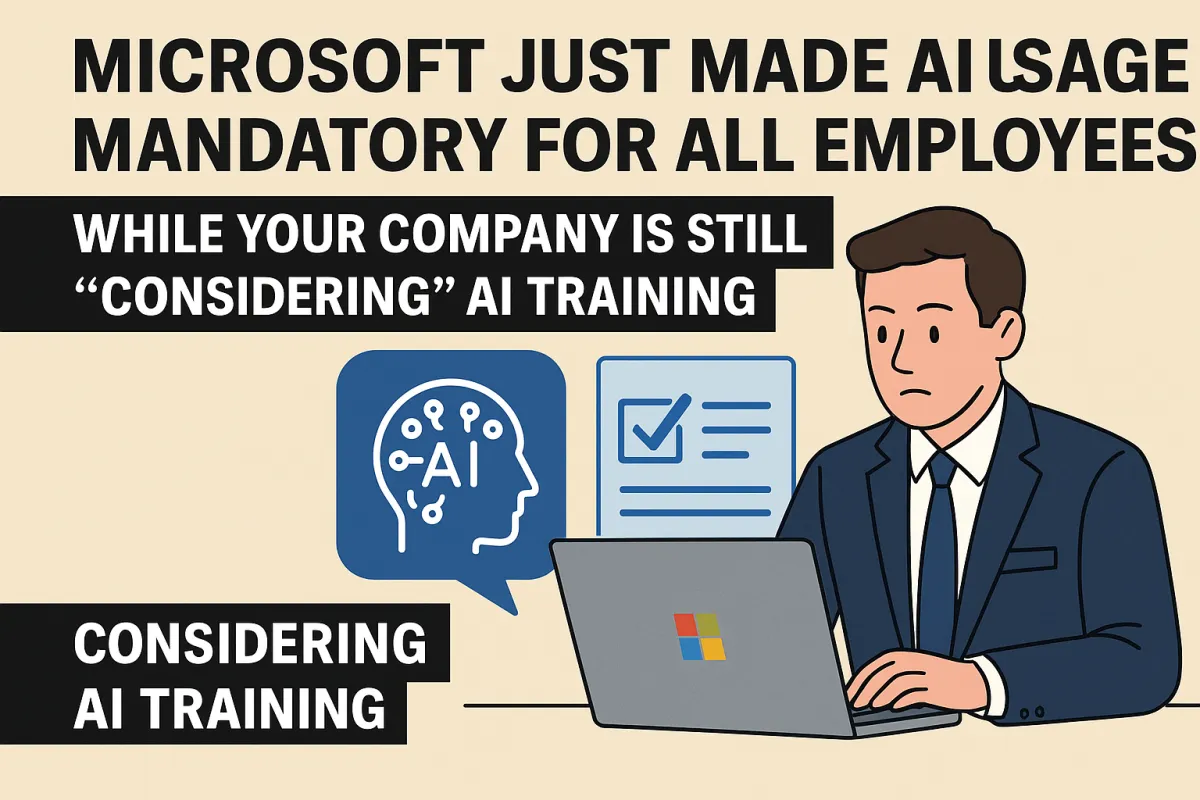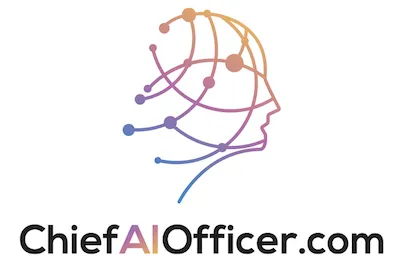
Why Microsoft's "Use AI or Hurt Your Career" Mandate Should Wake Up Every Executive Still Treating AI as Optional
Microsoft Just Made AI Usage Mandatory for All Employees While Your Company Is Still "Considering" AI Training
Microsoft has made AI usage mandatory across the entire company, instructing all employees to use internal AI tools such as Microsoft Copilot as part of their daily work. This policy is now directly tied to employee performance reviews, making AI engagement a non-negotiable aspect of every role and level within the organization.
While most companies debate whether to offer optional AI training, Microsoft has eliminated the choice entirely. Managers are required to evaluate employees based on their use of internal AI tools, with AI adoption considered alongside core competencies like collaboration and communication. Failure to adopt AI tools can negatively impact performance reviews.
This isn't just a Microsoft policy decision. This is a blueprint for the AI transformation mindset that separates market leaders from organizations that will become competitively obsolete.
The Mandatory AI Policy That Changes Everything
Microsoft President Julia Liuson emphasized in an internal memo that "AI is now a fundamental part of how we work. Just like collaboration, data-driven thinking, and effective communication, using AI is no longer optional—it's core to every role and every level."
The mandatory policy demonstrates how AI leaders approach workforce transformation through requirement rather than recommendation, ensuring comprehensive adoption rather than accepting partial implementation.
Organizations that treat AI adoption as optional will find themselves competing against companies where every employee operates with AI capabilities, creating insurmountable productivity and innovation gaps.
The Performance Review Integration Strategy
Managers at Microsoft are required to evaluate employees based on their use of internal AI tools, with some teams developing formal metrics to track and assess AI usage, especially for those involved in product development.
The performance review integration ensures that AI adoption becomes fundamental to career advancement rather than optional skill development that employees can choose to ignore.
Companies that maintain traditional performance evaluation approaches will find themselves unable to drive comprehensive AI adoption while competitors make AI proficiency essential for professional success.
The Non-Negotiable AI Competency Framework
Microsoft treats AI proficiency as core competency alongside collaboration, communication, and data-driven thinking, establishing AI fluency as fundamental professional requirement rather than specialized technical skill.
The competency framework demonstrates how successful AI transformation requires organizational culture change that makes AI literacy basic professional expectation rather than advanced technical capability.
Organizations that position AI as specialized skill rather than core competency will achieve limited adoption compared to companies that make AI fluency essential for all professional roles.
The Career Impact Reality
Failure to adopt AI tools at Microsoft can negatively impact performance reviews, signaling that AI proficiency has become key performance indicator that affects employment security and advancement opportunities.
The career impact reality reveals how comprehensive AI transformation requires consequences for non-adoption rather than relying on voluntary participation that creates uneven implementation across the organization.
Companies that implement AI without performance consequences will achieve lower adoption rates compared to organizations that make AI engagement essential for professional success and career development.
The Internal Adoption Acceleration
Microsoft's mandatory policy aims to boost internal adoption of their own AI solutions, particularly as usage of Copilot has lagged behind expectations and some employees prefer third-party AI tools.
The acceleration strategy demonstrates how AI companies must achieve internal adoption before expecting external customer adoption, ensuring workforce AI fluency drives product development and market positioning.
Technology companies that cannot achieve comprehensive internal AI adoption will struggle to compete in AI markets where workforce AI expertise drives product innovation and customer value creation.
The Competitive Pressure Response
The policy shift comes amid internal pressures including reports of potential layoffs and increased competition in the AI space, revealing how market dynamics drive organizational AI transformation.
The pressure response demonstrates how competitive markets force AI transformation through organizational requirements rather than gradual cultural change that may not match market evolution speed.
Companies operating in competitive markets face similar pressures to accelerate AI adoption through mandatory implementation rather than optional training that doesn't create competitive advantages.
The Workforce AI Standardization
Microsoft's approach standardizes AI usage across all roles and levels, eliminating variation in AI adoption that could create internal competitive disadvantages or operational inconsistencies.
The standardization strategy ensures that organizational AI capabilities develop uniformly rather than creating AI expertise gaps that limit collaborative effectiveness and operational optimization.
Organizations that allow uneven AI adoption will find themselves with fragmented capabilities compared to companies that achieve comprehensive AI fluency across entire workforce.
The Cultural Transformation Mandate
Making AI usage mandatory represents cultural transformation that changes fundamental assumptions about work processes, professional development, and organizational capability requirements.
The transformation mandate demonstrates how successful AI adoption requires top-down cultural change rather than bottom-up voluntary adoption that may not achieve comprehensive organizational transformation.
Companies that approach AI transformation through cultural suggestion rather than cultural requirement will achieve limited organizational change compared to mandatory implementation approaches.
The Professional Development Revolution
Microsoft's policy makes AI proficiency essential for professional development rather than optional skill enhancement, fundamentally changing career advancement requirements and employee value propositions.
The development revolution reveals how AI transformation affects human resource management, talent development, and career planning across entire organizational structures.
Organizations that maintain traditional professional development approaches will find themselves unable to prepare workforce for AI-driven competitive environments that require comprehensive AI capabilities.
The Productivity Optimization Strategy
Mandatory AI usage ensures that productivity optimization occurs across all organizational functions rather than limiting benefits to early adopters or technically sophisticated employees.
The optimization strategy demonstrates how comprehensive AI implementation creates organizational advantages that partial adoption cannot achieve through uneven capability development.
Companies that accept partial AI adoption will find themselves unable to compete with organizations that achieve complete workforce AI transformation through mandatory implementation.
The Innovation Acceleration Impact
When every employee uses AI tools, organizational innovation capacity increases through widespread AI-enhanced problem-solving, creativity, and strategic thinking capabilities.
The acceleration impact reveals how mandatory AI adoption creates innovation advantages that voluntary programs cannot achieve through limited participation and uneven skill development.
Organizations that limit AI innovation to specialized teams miss opportunities for enterprise-wide innovation enhancement that comprehensive AI adoption provides through universal capability development.
The Operational Consistency Requirement
Microsoft's mandatory approach ensures operational consistency where all employees operate with similar AI capabilities rather than creating workflow disruptions through uneven AI adoption.
The consistency requirement demonstrates how successful AI transformation requires uniform implementation rather than accepting operational variations that limit collaborative effectiveness and process optimization.
Companies that allow inconsistent AI adoption will face operational challenges that organizations with mandatory AI implementation avoid through standardized capability development.
The Market Leadership Positioning
Microsoft's mandatory AI policy establishes market leadership positioning that influences industry expectations and competitive requirements for AI adoption across technology sector.
The positioning impact reveals how comprehensive AI transformation creates industry influence that extends beyond internal operational benefits to market leadership and strategic partnership opportunities.
Technology companies that delay mandatory AI implementation will find themselves following rather than leading industry standards while comprehensive adopters establish dominant competitive positions.
The Risk Management Approach
Making AI usage mandatory represents risk management strategy that ensures organizational AI capabilities match competitive requirements rather than risking market disadvantage through incomplete adoption.
The risk approach demonstrates how market leaders treat AI adoption as competitive necessity rather than optional enhancement that organizations can delay without strategic consequences.
Companies that treat AI adoption as optional face competitive risks that organizations with mandatory implementation avoid through comprehensive capability development and market positioning.
The Talent Development Investment
Microsoft's policy represents significant talent development investment that ensures workforce AI capabilities support business strategy rather than hoping voluntary adoption creates necessary organizational capabilities.
The investment approach reveals how successful AI transformation requires systematic workforce development rather than relying on individual initiative that may not align with organizational strategic requirements.
Organizations that limit AI talent development investment will find themselves unable to compete with companies that ensure comprehensive workforce AI capabilities through mandatory training and implementation.
The Customer Experience Enhancement
When all Microsoft employees operate with AI capabilities, customer experience improves through enhanced problem-solving, faster response times, and more sophisticated service delivery across all customer touchpoints.
The experience enhancement demonstrates how internal AI adoption creates external competitive advantages through improved customer interaction quality and organizational responsiveness.
Companies that maintain traditional workforce capabilities will find themselves unable to compete with AI-enhanced organizations that deliver superior customer experience through comprehensive workforce AI transformation.
The Strategic Alignment Achievement
Microsoft's mandatory AI policy ensures strategic alignment between organizational AI capabilities and business objectives rather than accepting misalignment through partial implementation.
The alignment achievement reveals how comprehensive AI transformation requires organizational commitment that matches strategic importance rather than treating AI as departmental initiative.
Companies that fail to align AI adoption with strategic objectives will achieve limited value compared to organizations that ensure comprehensive implementation supports business strategy through mandatory workforce engagement.
The Future Workforce Reality
Microsoft's mandatory AI policy establishes workforce reality where AI capabilities become minimum professional requirements rather than competitive advantages available to technology leaders only.
The future reality reveals why AI transformation requires immediate comprehensive action rather than gradual implementation that delays competitive advantage while mandatory adopters establish market dominance.
The choice facing every executive is whether to make AI adoption mandatory for competitive advantage or continue optional approaches while AI-required competitors establish insurmountable operational and market advantages.
The Executive Decision Framework
Microsoft's mandatory AI implementation provides decision framework that executive teams across all industries can adapt for their own competitive circumstances and organizational requirements.
The framework prioritizes comprehensive adoption over voluntary participation, performance integration over optional training, and competitive advantage over gradual cultural change.
Organizations that apply similar mandatory approaches will achieve AI transformation while companies that rely on voluntary adoption will struggle to compete with organizations where AI capabilities are universal rather than optional.
The evidence is overwhelming: Microsoft made AI mandatory because competitive markets require comprehensive AI capabilities rather than partial adoption. The strategic choice facing every executive team is whether to make AI adoption mandatory for competitive advantage or accept permanent disadvantage to organizations that require rather than request AI engagement.

